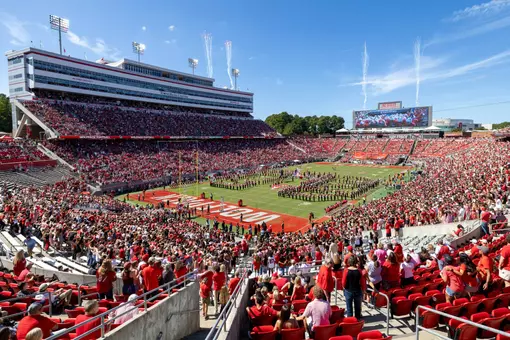North Carolina State University Athletics

Coaching In The Trenches
10/27/2004 12:00:00 AM | Football
Oct. 27, 2004
The quintessential football coach, Mike Barry is a hard-nosed guy who demands results from the Wolfpack's offensive line. Now in his second season at NC State, Barry has been in coaching for 35 years, working at a variety of levels, from high school to professional. The son of a second-generation Irish immigrant, Barry grew up in Chicago. His father worked as a salesman and his mother in retail.
Playing football, baseball and a little basketball in high school, Barry was also a boxer. His first love was football however and he became the first in his family to go to college when he earned a football scholarship at Southern Illinois. Graduating in 1969, Barry took his first job coaching high school football and never looked back. Winning national championships with Colorado in 1990 and Tennessee in 1998, Barry brings a wealth of knowledge to the Wolfpack coaching staff and a successful formula to NC State's offensive line.
"I've wanted to be a coach since I was 16 years old," Barry said. "My high school coach was my hero and I wanted to be just like him. I like being the offensive line coach and my goal has always been to be the best that I could be at what I do. My life has been blessed with the opportunities that I've had, the players I've coached and the programs that I've worked with."
Honing his craft for nearly four decades, Barry has learned from a variety of people and has been influenced by a host of great football coaches. He singles out three coaches that he considers to be his mentors: Joe Moore, the offensive line coach at Pittsburgh and then at Notre Dame, Rollie Dotsch, the offensive line coach for the Pittsburgh Steelers during their days of dominance, and Jerry Hanlon, the longtime offensive line coach at Michigan.
"Those three offensive line coaches really molded my coaching style and my emphasis on technique," Barry said. "I learned all the basics from them."
Barry also learned a great deal about coaching off the field. He had gone from coaching high school to Southern Illinois to Arizona and then to the USFL.
"One of the greatest lessons I learned as a young coach was in the summer of 1985, when the USFL disbanded and I was without a job in the fall of 1985." Barry recalled. "I was living in Portland, Ore., with no job, no insurance and no car. I worked cement construction that fall. I was a laborer. I made seven dollars an hour and was able to get unemployment because the guy paid me cash. I was a migrant worker. I literally had two dollars a day for lunch. My wife would drop me off at work, take the kids to school and then go to work. I would have to find my own way home. Somedays I would hitchhike, sometimes I could get a ride."
That was rock bottom for Barry, but there was still another bump in the road ahead.
"I had my coaching career taken away from me, but I was bound and determined to get back into coaching," Barry stated. "In 1986 I was hired by Jim Criner at Iowa State. He was fired that December, so I was without a job by the end of December. I took a job at a high school as a special education teacher. I had the behavioral disorderlies. For eight weeks I had the kids that were suspended, the kids who had drug problems and the kids who had been kicked out of school. I had them in a room for six hours a day."
Refusing to give up on coaching, Barry anxiously awaited a phone call for an offensive line coach opening. Two calls came, one from Mike Gottfried at Pittsburgh and one from Bill McCartney at Colorado. Barry took the job with the Buffaloes and moved to Boulder to begin preparation for the 1987 season.
"Everything worked out, but in 1985 I was unemployed, doing cement construction and in 1990 we won the National Championship at Colorado," Barry said. "Just the opportunity to get back into coaching after I had lost that ... I'll never forget that. That is something that I always think of when I think that things are getting bad. Now I believe that no matter how bad things get, there is always something better on the horizon. You just have to keep forging ahead and not feel sorry for yourself."
A proud grandfather of four, Barry considers himself blessed to have his two children grow up to be so successful. His daughter Courtney works for a cancer-research center in Seattle and his son Joe is an assistant coach for the Tampa Bay Buccaneers. Barry knows it wasn't easy for them, growing up in the house of a football coach.
"My son went to three different junior highs and three different high schools because we were moving around so much," said Barry, shaking his head. "My daughter had to make the same moves, but I think those are harder on a girl than for a boy. Joe always had teammates that were immediate friends, but she had to go out and make new friends each time. I feel bad about it, but they came out of it okay and I am very proud of both of them."
Part of what makes him such a great coach are the things Barry does and says to motivate his players. At least once a practice Barry is guaranteed to drop an old-school phrase that seems to provide a brief moment of levity to a situation and allows the player needing instruction to refocus.
"Some of it is just spur of the moment," Barry admits. "Some of it I've said time and time again. Some of it is an attempt to inject a little humor into practice. I just try to get their attention. I have a little too much sarcasm in my tone sometimes. Several of my players say that they are going to write a book someday on Mike Barryisms. Some of them are goofy. Some of them don't make any sense and some of them probably expose my IQ."
Some fans might think that a coach's job is done after the last game of the season ends, but between recruiting, scouting, workouts, counseling, spring ball and then the practices and games during the season, coaching football is a 12-month commitment. Ask Barry which part is his favorite, and he'll not even tell you what time of year, but what time of day.
"The best part of my day is at 2:15 when I get to go meet with the guys, talk with them, be a part of their day and then we go out on the field," said Barry with a hoarse, excited voice and a twinkle in his eyes. "I love on-the-field coaching and the build-up to the game. My offensive line versus that defensive coach's line on the other side. No one cares what you did last week. It's what you have done lately and you're judged on how you play the next Saturday. That's the part of the game that motivates me as a coach."




